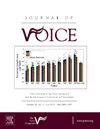人格、身体和心理健康与音域特征的关系
IF 2.5
4区 医学
Q1 AUDIOLOGY & SPEECH-LANGUAGE PATHOLOGY
引用次数: 0
摘要
目的:有文献证明,嗓音特征与身心健康有关。这项探索性研究的目的是确定通过音域曲线(VRP)测量的嗓音参数与性格、心理和身体健康之间的关系:研究设计:基于人群的横断面研究:作为 LIFE-成人研究的一部分,从普通人群中随机抽取了 2639 名 18-80 岁的人,他们完成了说话和唱歌两种嗓音任务,并回答了有关抑郁、焦虑、生活满意度、个性和生活质量的问卷。使用的嗓音参数包括基频、声压级及其范围和最大发音时间。通过相关分析和回归分析研究了这些参数之间的联系:结果:最低和最高频率之间、最低和最高声压级之间更宽的范围以及更长的最长发音时间与男女的外向性和生活质量以及女性的开放性和合群性有显著相关性。较小的范围和较短的最大发音时间与抑郁有明显的相关性。男性的神经质与最大发音时间成反比。在口语 VRP 中,声压级的相关性比基频更明显。在唱歌的 VRP 中,情况正好相反。焦虑、生活满意度和自觉性的相关性很小:在这项探索性研究中,从 VRP 得出的嗓音参数与身心健康和性格之间的关联较弱。结果表明,在临床环境中,VRP 测量不会受到这些参数的显著影响,因此是一种可靠的嗓音参数测量方法。本文章由计算机程序翻译,如有差异,请以英文原文为准。
Associations of Personality, Physical and Mental Health with Voice Range Profiles
Objectives
There is evidence in the literature that voice characteristics are linked to mental and physical health. The aim of this explorative study was to determine associations between voice parameters measured by a voice range profile (VRP) and personality, mental and physical health.
Study design
Cross-sectional population-based study.
Methods
As part of the LIFE-Adult-Study, 2639 individuals aged 18-80 years, randomly sampled from the general population, completed both speaking and singing voice tasks and answered questionnaires on depression, anxiety, life satisfaction, personality and quality of life. The voice parameters used were fundamental frequency, sound pressure level, their ranges and maximum phonation time. The associations were examined with the help of correlation and regression analyses.
Results
Wider ranges between the lowest and highest frequency, between the lowest and highest sound pressure level and longer maximum phonation time were significantly correlated with extraversion and quality of life in both sexes, as well as openness and agreeableness in women. Smaller ranges and shorter maximum phonation time were significantly correlated with depression. Neuroticism in men was inversely correlated with the maximum phonation time. In the speaking VRP, the associations for sound pressure level were more pronounced than for the fundamental frequency. The same was true in reverse for the singing VRP. Few associations were found for anxiety, life satisfaction and conscientiousness.
Conclusions
Weak associations between voice parameters derived from the VRP and mental and physical health, as well as personality were seen in this exploratory study. The results indicate that the VRP measurements in a clinical context are not significantly affected by these parameters and thus are a robust measurement method for voice parameters.
求助全文
通过发布文献求助,成功后即可免费获取论文全文。
去求助
来源期刊

Journal of Voice
医学-耳鼻喉科学
CiteScore
4.00
自引率
13.60%
发文量
395
审稿时长
59 days
期刊介绍:
The Journal of Voice is widely regarded as the world''s premiere journal for voice medicine and research. This peer-reviewed publication is listed in Index Medicus and is indexed by the Institute for Scientific Information. The journal contains articles written by experts throughout the world on all topics in voice sciences, voice medicine and surgery, and speech-language pathologists'' management of voice-related problems. The journal includes clinical articles, clinical research, and laboratory research. Members of the Foundation receive the journal as a benefit of membership.
 求助内容:
求助内容: 应助结果提醒方式:
应助结果提醒方式:


